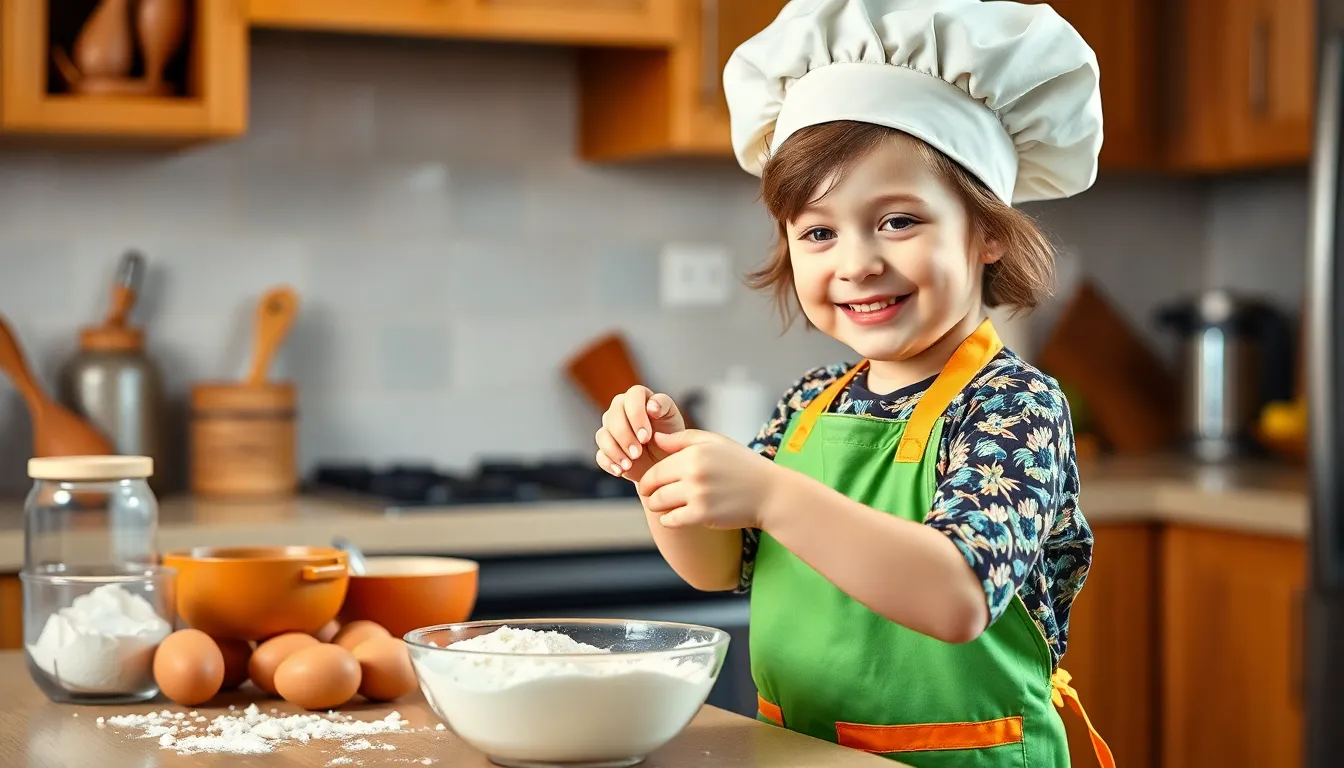Baking with children is more than just mixing flour and sugar; it’s a delightful adventure that sparks creativity and builds lasting memories. As kids roll dough and sprinkle toppings, they learn valuable skills like measuring, following instructions, and even patience. This hands-on experience not only nurtures their culinary talents but also fosters a sense of accomplishment.
Table of Contents
ToggleBenefits of Baking With Children
Baking with children offers numerous advantages that contribute to their growth and development. It not only engages them in a fun activity but also fosters essential skills and connections.
Encourages Creativity
Baking encourages creativity in children through ingredient selection, decoration, and flavor experimentation. Children can choose toppings like sprinkles or fruits, allowing them to express their preferences. They can decide on unique flavor combinations, enhancing their ability to think outside the box. This freedom boosts confidence and self-expression, vital elements in a child’s development.
Teaches Life Skills
Baking teaches children critical life skills essential for future independence. Measuring ingredients hones mathematical skills, as they learn about fractions and volumes. Following recipes enhances their ability to comprehend and execute instructions, promoting critical thinking. Patience develops as they wait for baked goods to rise and cool. Additionally, cleaning up instills a sense of responsibility, emphasizing the importance of maintaining a tidy workspace.
Tips for Successful Baking Sessions

Successful baking sessions require planning and awareness of children’s abilities and safety needs. The following tips ensure enjoyable and educational experiences in the kitchen.
Choosing Age-Appropriate Recipes
Choosing recipes that match children’s skill levels enhances their baking experience.
- Beginner-friendly options: Select simple recipes like cookies, muffins, or pancakes. These recipes typically require fewer steps, making them manageable for young bakers.
- Intermediate challenges: Opt for recipes involving mixing and decorating. Children ages 8-12 can tackle basic cakes or brownies that allow for creativity while incorporating more techniques.
- Advanced projects: Encourage tweens and teens to try more complex recipes, such as pastries or elaborate layer cakes. This age group benefits from the challenge and develops culinary skills.
Ensuring Safety in the Kitchen
Ensuring safety in the kitchen is critical when baking with children.
- Supervise closely: Adults should supervise all baking activities. Constant oversight minimizes accidents, especially when using sharp tools or hot surfaces.
- Establish boundaries: Designate specific areas in the kitchen for children. Teach them to stay clear of the stove and hot surfaces unless assisted.
- Use appropriate tools: Provide age-appropriate utensils. Use plastic knives for younger children to avoid cuts and provide non-slip cutting boards for added stability.
- Discuss hygiene: Reinforce the importance of washing hands before and after handling food. This practice reduces the risk of foodborne illness.
Engaging Activities for Different Age Groups
Baking activities can be tailored to suit children of various ages, allowing them to engage meaningfully in the kitchen. Here are some ideas for preschoolers and school-age children.
Preschoolers
Preschoolers thrive on hands-on experiences. Focus on simple, fun activities that keep them engaged and safe.
- Stirring and Mixing: Allow preschoolers to mix ingredients in a bowl. They enjoy the tactile sensation and the sounds of whisking or stirring.
- Decorating: Provide icing, sprinkles, and edible decorations for them to personalize cupcakes or cookies. This fosters creativity and self-expression.
- Measuring: Use large measuring cups and spoons for preschoolers to learn about measuring ingredients. They can grasp concepts like full or empty while having fun.
- Shape Making: Encourage them to use cookie cutters to create fun shapes from dough. This activity enhances fine motor skills.
School-Age Children
School-age children are ready for more complex tasks. Offer them opportunities to build their baking skills and independence.
- Recipe Reading: Teach school-age children to read recipes. They can learn how to follow instructions and understand the sequence of steps.
- Ingredient Selection: Involve them in selecting ingredients at the grocery store. This encourages decision-making and helps them understand flavor combinations.
- Time Management: Introduce timers for baking and cooling periods. They can learn how to manage time effectively while following a recipe.
- Advanced Techniques: Support them in learning techniques like measuring flour accurately or creaming butter and sugar. These skills build confidence and competence in the kitchen.
Common Challenges and How to Overcome Them
Baking with children presents unique challenges, but overcoming these obstacles enhances the overall experience. The following subsections address common issues and provide actionable solutions.
Mess and Clean-Up
Messiness is inevitable when baking with children. Flour, sugar, and other ingredients often end up in unexpected places. To manage this, prepare the workspace by covering surfaces with old newspaper or baking mats. Encourage children to help clean as they go, turning it into a fun part of the process. Use containers to organize ingredients, keeping tasks orderly. Designate specific areas for each step to maintain focus and minimize clutter. Reinforcing the idea that cleaning is part of baking cultivates responsibility.
Patience and Timing
Baking requires patience, and children often struggle with waiting. To address this, set realistic expectations for each baking session. Use timers to create a sense of urgency with a fun twist. For example, during waiting periods, introduce simple kitchen tasks like washing utensils or measuring ingredients for the next step. Provide encouragement and praise to foster a positive attitude towards patience. Break down recipes into manageable steps to reduce overwhelmed feelings and promote a sense of accomplishment as they complete each task.
Baking with children is more than just a fun pastime; it’s a powerful tool for growth and creativity. As kids mix ingredients and watch their creations rise, they gain valuable skills that extend beyond the kitchen. The experience fosters a sense of accomplishment and boosts their confidence, setting the stage for future independence.
By choosing age-appropriate recipes and maintaining a safe environment, parents can ensure that baking sessions are both enjoyable and educational. Embracing the inevitable mess and challenges only adds to the memories created. Ultimately, baking together not only strengthens bonds but also equips children with essential life skills they’ll carry into adulthood.




